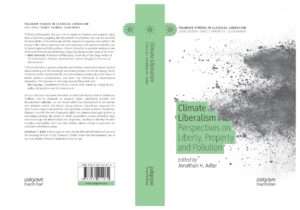The Volokh Conspiracy
Mostly law professors | Sometimes contrarian | Often libertarian | Always independent
Judge Glock on "Climate Liberalism"
A review of Climate Liberalism: Perspectives on Liberty, Property & Pollution at Law & Liberty.
The Manhattan Institute's Judge Glock has a favorable review of Climate Liberalism: Perspectives on Liberty Porperty & Pollution over at Law & Liberty. Here is a taste:
A recent collection of essays edited by Jonathan Adler seeks to answer the question of whether "classical-liberal principles" can provide a distinctive perspective on climate change. After reading Climate Liberalism, I think the answer is no, they cannot. Insofar as government is going to respond to climate change, this book shows that the classical liberal or even libertarian response will look a lot like the modern liberal response.
Yet the book is a success at demonstrating, first, how contemporary responses to climate change can be fit into a classically liberal perspective, and, second, how much the free-market response to environmental problems in general has come to inform modern liberals' response, including their response to climate change. If classical liberals are going to wrestle with this issue, this book should make them comfortable that they can do so in their own tradition and without falling into anti-capitalist extremes.
I take the point, but I might shift the emphasis. Yes, I believe some contributions to the book suggest that classical liberals need to think about how government should respond to the threat of climate change more than whether it should respond. I further agree that climate change (like, perhaps, national security and disease) requires the consideration of governmental actions that classical liberals would generally (and rightly) resist. But I also believe -- and hope the book helps suggest -- that a classical liberal perspective is useful in evaluating competing climate policy options, both in terms of what sorts of policies may be effective and what sorts of policies are most compatible with a concern for individual liberty.
As Glock notes, the book focuses on political theory and policy, not science, and there is a reason for that.
The book makes a wise decision to separate the question of the science of climate change from the political question of what to do about it. Since there is no "classical liberal science" just as there is no "socialist science," this book does not try to contribute to that debate. But, as several authors note, even if one thinks the scientific consensus on climate is open to question, and even if one brings an appropriate humility to our ability to imagine the future, that provides little reason to pretend there could not be any costs to climate change, or at least that there could not be some risk to it.
For myself, a classical liberal skepticism of centralized governmental action, combined with an appreciation for how slow and brittle regulatory measures can be, cautions strongly against the sort of regulatory measures favored by progressives, particularly when there are alternative ways to mitigate the threat of climate change. A revenue-neutral carbon tax, for instance, leaves individuals and firms free to respond to energy prices along any margin they wish, providing incentives for emission reduction where such reductions can be achieved efficiently and with only a minimal reduction in the degrees of freedom individuals and firms have to act. Such a policy also avoids the fatal conceit of regulators and planners who think they know when and in what form emission reductions should be achieved. Even an imperfectly calculated tax can fulfill this purpose, and significantly more effectively than the regulatory alternative.
Glock's review concludes:
Insofar as there is a single message in this book, it is the simple but powerful reminder that a classically liberal perspective demands humility—humility about how well policymakers can understand humanity's well-being and also about the ability of government to improve that well-being. But the book also reminds us that humility does not mean indolence. Just as classical liberals or libertarians cannot punt on the issues of national defense or public safety and merely gesture to the free market, despite some heroic attempts at trying, they also cannot pretend any attempt at addressing climate change is beyond the ideological pale. Climate change will remain a political issue, which means it will involve weighing evidence, trying to align public and private incentives, and coming to a political agreement on complex and almost unknowable issues. The best tradition of classical liberalism has done that in other spheres, and it can do it here.
I appreciate the engagement and the kind words for the book and the project it represents.



Show Comments (254)